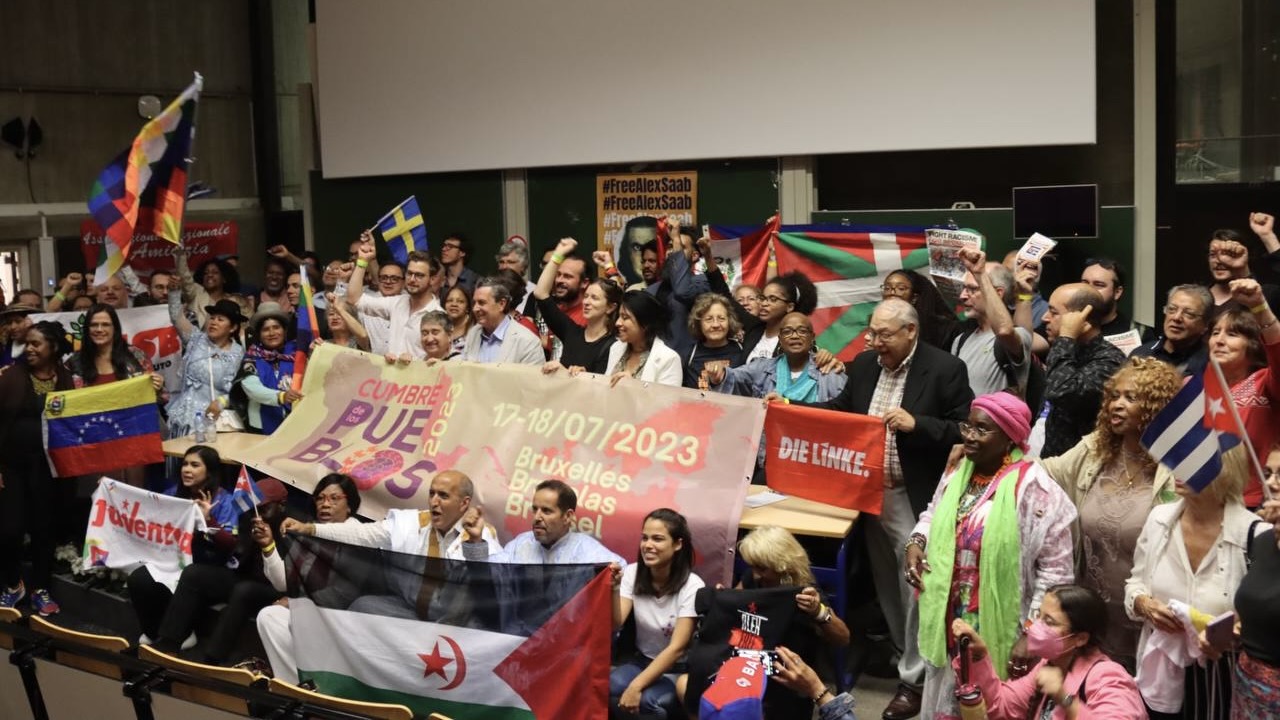Without sovereignty and mutual respect, dialogue between regions is impossible. Throughout the days of debate and work at the People’s Summit held parallel to the III CELAC-EU Summit, trade union activists, community leaders, left political leaders, artists, and students from across Latin America and the Caribbean and Europe ratified the importance of spaces for democratic and plural debate between equal partners. The summits occurred simultaneously in the Belgian capital of Brussels from July 17-18 after a eight-year pause.
The People’s Summit, held at the Free University of Brussels, was organized by a broad coalition of over 100 organizations, collectives, unions, political parties, and movements. The organizers included ALBA Movimientos, INTAL, CELAC Social, IPA, Jornada Continental for Democracy Against Neoliberalism, the Network of Intellectuals, Artists and Social Movements in Defense of Humanity (REDH), and the Party of the European Left.
More than 1,000 people participated in the People’s Summit and there were delegations present from countries across the two regions, including Cuba, Brazil, Venezuela, Peru, Colombia, Honduras, Bolivia, Mexico, Haiti, Argentina, Puerto Rico, Ecuador, Chile, Belgium, Germany, Greece, Italy and Holland.
Panel discussions were held during the two days of the Summit on the topics of Latin America as a zone of peace, strengthening the movement in solidarity with Cuba and against the blockade, ecological transition, decolonization and depatriarchalization, migration and exile, new forms of dirty war, and more.
Read more: Ahead of III CELAC-EU Summit, movements from both continents build People’s Summit
On the evening of July 17, over 1,000 people gathered in the Nelson Mandela Auditorium in the Festival of Cultural Solidarity between Latin American, Caribbean and European Peoples to celebrate Latin American music and dance and hear from special invitees Cuban President Miguel Díaz-Canel, Colombian President Gustavo Petro, Bolivian President Luis Arce, Venezuelan Vice-President Delcy Rodríguez, leader of La France Insoumise Jean-Luc Mélenchon, President of the Workers’ Party of Belgium (PTB) Raoul Hedebouw, and others.
The political leaders rejected the historic relationship between Europe and Latin America characterized by colonialism, exploitation of Latin America’s resources, domination, racism, and exclusion. They said that both the CELAC-EU summit and the People’s Summit were key opportunities to redefine this relationship, albeit with pushes and pulls.
The Latin American leaders insisted on the need to build relations based on equal respect, autonomy, and sovereignty amid attempts to undermine and pressure them by European leaders. For their part, left European leaders Mélenchon and Hedebouw rejected the colonial attitude of the EU and affirmed that Europe, which is under threat by the rise of the far-right and fascism, must learn by the Latin American example of building progressive people’s movements with the capacity to win.
The closing ceremony of the People’s Summit was held at the European Parliament with the presence of members of European Parliament and Latin American leaders. The final statement of the People’s Summit was presented there by the Secretary General of the São Paulo Forum, Monica Valente, and José Luis Centella of the Communist Party of Spain.
In the final statement, the organizations committed to intensifying the struggle against all of the unilateral coercive measures imposed by the US government and the EU against countries of Latin America and the Caribbean. They declared their support for the struggle against patriarchy in both regions and vowed to strengthen efforts to combat climate catastrophe and environmental devastation, promote equal and fair economic relations between the regions without colonial debt and neoliberalism, and defend the sovereignty, dignity, and independence of all nations.
The text says, “We observe with interest the advance of the forces that defend a new multipolar and multicentric international order, which announces the progressive advent of a world architecture based on solidarity and cooperation between sovereign countries. In this way we see with optimism and affinity, the new progressive wave that is making its way in Latin America and the Caribbean. We salute their heroic struggles in defense of sovereignty, social welfare and participatory democracy, with the objective of improving the living conditions and existence of the peoples, promoting unity and regional integration in solidarity, reactivating CELAC and UNASUR with more strength.”
In the closing ceremony, Colombian President Gustavo Petro reflected on the imperative necessity to unite as peoples of the world in the defense of life on the planet from predatory private capital. He declared: “There is going to be a multicolored spectrum fighting for life and clinging to life. And our role is to give light to these social, political and human uprisings, and to articulate them in such a way that it is life that overcomes capital, and not capital overcoming life, [and] sinking [even] itself.”





